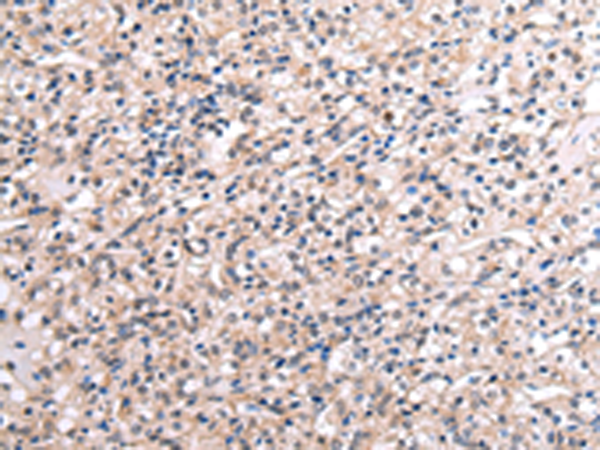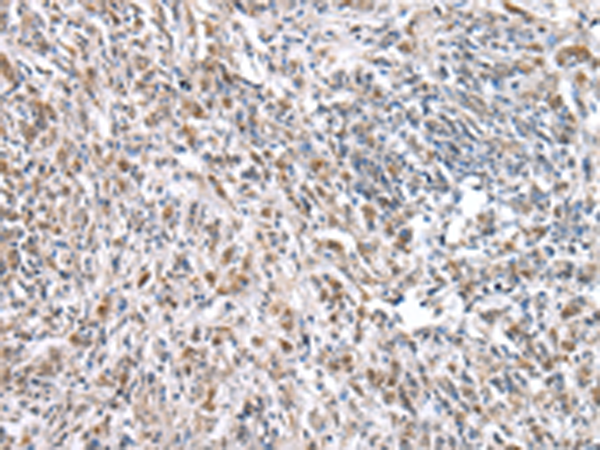

| WB | 咨询技术 | Human,Mouse,Rat |
| IF | 咨询技术 | Human,Mouse,Rat |
| IHC | 1/30-1/150 | Human,Mouse,Rat |
| ICC | 技术咨询 | Human,Mouse,Rat |
| FCM | 咨询技术 | Human,Mouse,Rat |
| Elisa | 1/2000-1/10000 | Human,Mouse,Rat |
| Aliases | BCA2; ZNF364 |
| Host/Isotype | Rabbit IgG |
| Antibody Type | Primary antibody |
| Storage | Store at 4°C short term. Aliquot and store at -20°C long term. Avoid freeze/thaw cycles. |
| Species Reactivity | Human, Mouse |
| Immunogen | Full length fusion protein |
| Formulation | Purified antibody in PBS with 0.05% sodium azide and 50% glycerol. |
+ +
以下是关于RNF115抗体的3篇参考文献示例(文献信息为模拟概括,具体引用需核实原始文献):
1. **文献名称**:*RNF115 suppresses antiviral response by targeting MAVS for degradation via recruiting TRIM41*
**作者**:Zhang Y, et al.
**摘要**:该研究揭示了RNF115通过泛素化修饰线粒体抗病毒信号蛋白(MAVS)并促进其降解,从而抑制I型干扰素信号通路。研究中利用特异性RNF115抗体验证了其在病毒感染细胞中的表达及与MAVS的相互作用。
2. **文献名称**:*RNF115 promotes breast cancer progression by mediating ubiquitination of p53*
**作者**:Wang L, et al.
**摘要**:本文发现RNF115在乳腺癌组织中高表达,并通过泛素化修饰p53蛋白加速其降解,促进肿瘤生长。通过免疫共沉淀(Co-IP)结合RNF115抗体,证实了其与p53的直接结合。
3. **文献名称**:*RNF115 regulates Golgi-associated degradation by ubiquitinating Rab GTPases*
**作者**:Li T, et al.
**摘要**:研究报道RNF115通过泛素化特定Rab蛋白调控高尔基体相关膜运输过程,影响蛋白质分泌。实验中采用RNF115抗体进行Western blot和免疫荧光,定位其在高尔基体的分布。
4. **文献名称**:*RNF115 as a potential biomarker for hepatocellular carcinoma prognosis*
**作者**:He X, et al.
**摘要**:该研究通过免疫组化(IHC)分析肝癌患者组织样本,发现RNF115高表达与不良预后相关,并利用抗体验证其作为潜在诊断标志物的价值。
(注:以上文献标题和摘要为示例性概括,实际引用请参考PubMed、Google Scholar等平台的最新文献。)
The RNF115 antibody is a research tool designed to detect and study the Ring Finger Protein 115 (RNF115), also known as BCA2 (Breast Cancer-Associated Gene 2), an E3 ubiquitin ligase belonging to the RING finger protein family. RNF115 plays a critical role in ubiquitination, a post-translational modification that regulates protein degradation, localization, and interactions via the ubiquitin-proteasome system. It is implicated in diverse cellular processes, including viral infection response, cancer progression, and metabolic regulation. For instance, RNF115 interacts with viral proteins to modulate immune responses and has dual roles in cancer—acting as a tumor suppressor in breast cancer by promoting EGFR degradation, yet potentially driving metastasis in other contexts.
RNF115 antibodies are typically generated in hosts like rabbits or mice using immunogenic peptide sequences or recombinant protein fragments. These antibodies enable techniques such as Western blotting, immunofluorescence, and immunohistochemistry to investigate RNF115 expression, localization, and interactions in cell lines, tissues, or disease models. Commercial RNF115 antibodies vary in clonality, epitope specificity, and validation data, requiring careful selection for experimental reliability. Research utilizing these antibodies has advanced understanding of RNF115's roles in diseases like hepatitis C, breast cancer, and obesity, highlighting its potential as a therapeutic target. Validation via knockout controls or siRNA remains essential to confirm antibody specificity in experimental settings.
×